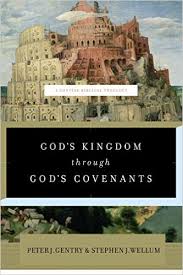|
Reading books on biblical and systematic theology can be a great way to grow in our knowledge of (and love for!) God and His Word. I was recently reminded of the value of reading these sorts of books, as I dug a bit more deeply into how we should think about "covenants" in the Bible. To someone who's new to reading the Bible, the word "covenant" may sound abstract and intimidating. But that's not the case! "Covenant" - at a very basic level - refers to a relationship that is forged between two people (or parties). Covenant is about relationship. And as we read through the Bible - both Old and New Testaments - covenant language keeps coming up that pushes the storyline along. God exists in relationship with Adam and Eve in the Garden of Even. God enters into covenantal relationship with Noah, Abraham, Israel (often called the Mosaic Covenant), and David. The Old Testament looks ahead to a New Covenant, which is ultimately fulfilled in Christ (even if the full experience of that New Covenant has elements that remain future). Here's the bottom line. Covenant is about relationship (in this case, relationship with God!). And covenant comes up a lot in the Bible. Both of these things should alert us to the value of having some basic understanding of covenant. Enter: Peter Gentry and Robert Wellum, and their recent God's Kingdom through God's Covenants: A Concise Biblical Theology (Crossway, 2015). Here's an excerpt from the book (pp. 255-56) that is saturated with depth, meaning, and implication: On the one hand, the covenants gloriously unveil the sovereign promise making and covenant keeping God who never fails. As Creator and Lord, he chooses to enter into relationships with his creatures, and in those relationships he always shows himself to be the faithful partner - true to himself, his own character, and his promises - and as such, he calls us to trust in him completely [see Hebrews 6:17-18]. The covenants, then, reveal first and foremost our gracious triune God who is the promise maker and promise keeper and who unilaterally guarantees that his promises will never fail. Whether it is with Adam or with other covenant heads, God's commitment to his image-bearers and creation, tied to his promise in Genesis 3:15, will never fail. That same promise runs across the entire Canon, and it is through the biblical covenants that it takes on greater clarity and expansion until it reaches its crescendo in the person and work of Christ. Interested in other theological resources that are saturated with meaning, and that will help orient you to robust evangelical Christian theology? Here are eight theological resources I generally point people towards first. Any one of these can serve you well.
0 Comments
Leave a Reply. |
Tim WiebeChristian. Husband. Father. Pastor. Learner. Contributor. Reader. Categories
All
Archives
June 2024
|
© 2014-2024 | 11607 M Circle, Omaha NE, 68137 | www.thebrooksideinstitute.net


 RSS Feed
RSS Feed
